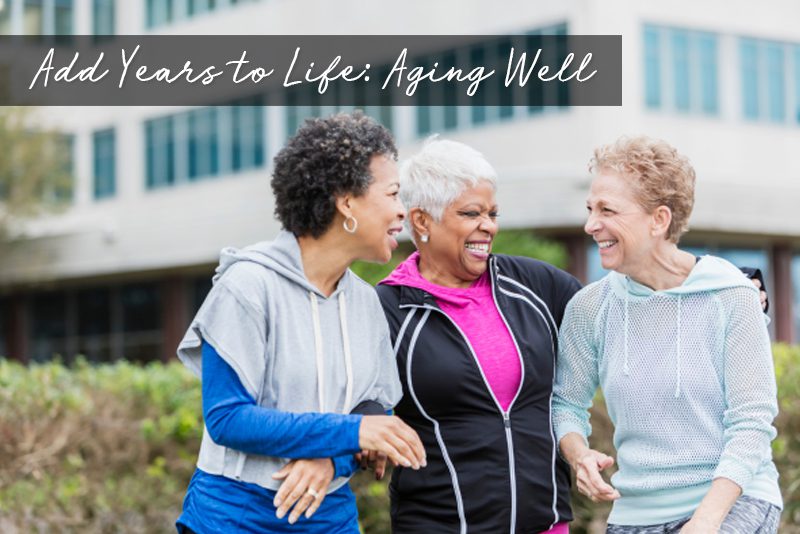Dr. Jaffe often talks about adding years to life and life to years by changing what we eat, drink, think, and do as part of the Nature’s Alkaline Way and Nature’s pHarmacy® approach. This advice is important to all, but especially relevant to seniors and middle-aged adults looking to extend their healthspan (years lived in good health; free from chronic disease and disability). Two interesting studies were published earlier this year that suggested simple lifestyle changes can extend your healthspan by as much as 10 years, and they echo what Dr. Jaffe has been saying for decades! It’s never too late to start making changes that will help you live long and well.
EAT
In the first article, researchers examined the diets of people in five places in the world, so-called “blue zones,” where many people live to be 100 or more, while maintaining good health. While the specific diets differed among these various locations and groups, there were some similarities across all that can inform our future choices..
Legumes. People in all of the blue zones consumed at least a cup of lentils, beans, or peas each day. Legumes are a predominant source of fiber, which helps decrease blood sugar and cholesterol levels, helps protect against diabetes, and lowers risk of cardiovascular disease. Consider adding a cup of legumes to your diet each day.
Nuts. Blue zone inhabitants eat nuts as snacks and as a dietary staple in favorite recipes. Nuts are rich in fiber, vitamins and minerals and have been shown to provide a cardioprotective effect against heart disease and stroke. Just a handful of almonds, pistachios, walnuts, pecans, or cashews will do the trick. We recommend choosing alkalinizing almonds or cashews. Try our healthy almond green goddess dressing for an extra almond boost.
In addition to eating legumes and nuts, we also recommend eating lower on the food chain, adding probiotic and fermented foods to your diet, choosing grasses rather than grains, eating humanely-slaughtered meats (if eating meats at all), avoiding processed oils and added sugar, and choosing immune-system friendly foods. Check out our article on eating the Alkaline Way for more details.
When you eat matters. People in the blue zones ate most of their calories earlier in the day, with nearly all eating large breakfasts, moderate lunches, and small to no dinners. This aligns with the fact that our bodies metabolize food more efficiently in the morning and early afternoon. Studies have indicated that consuming a majority of calories earlier in the day can lead to weight loss and improvements in blood sugar and LDL-cholesterol levels, while reducing feelings of hunger.
With whom you eat matters. The final similarity across all the blue zones was a tendency for families to eat together at least once daily. During family meals, people typically ate more slowly and consumed fewer calories while eating foods that were more nutritionally sound.
DRINK
Dehydration is a concern for all ages, but especially for older adults. We recommend consuming 8 glasses of mineral-rich water each day. Dehydration can lead to confusion, lightheadedness, weakness and headaches. Studies have shown that proper hydration can be linked with healthy aging and development of fewer chronic conditions.
We recommend starting each meal with something warm and wet, and adding more low-sodium broths and soups to your meals. Add muddled fruit or a splash of lemon or lime to your mineral water, and try herbal teas, either warm or iced. Avoid sugary drinks and plastic bottles. Learn more healthy hydration tips here.
THINK AND DO
The second article looked at the exercise and movement types that best benefit older adults. There are four separate components of age-related decline that can negatively impact one’s ability to live independently and perform the activities of daily living such as getting in and out of bed, showering, getting dressed, eating, walking, etc. Each of the four: cardio-respiratory fitness, balance, flexibility, and muscle strength, can be improved by taking proactive steps.
Cardio-respiratory fitness is the area most often mentioned and studied when it comes to wellness. It tends to deteriorate over time, even in healthy people, and that decline accelerates as we age. Studies have confirmed that a reduction in aerobic fitness leads to a loss of independence, and that a regular program of aerobic activity can slow or reverse this normal deterioration.
We recommend getting your body moving every day, preferably for 30 minutes or more, which is line with CDC recommendations. The CDC’s exercise guidelines for adults 65 and older include 150 minutes of moderate intensity aerobic activity such as brisk walking, dancing, running, or biking each week. The benefit of moderate-intensity aerobic exercise seems to increase when continued multiple times a week over time.
Balance and flexibility. While aerobic exercise is discussed a lot, we don’t often hear much about balance and flexibility, and why they are important to preserve as we age. As muscle mass declines by 3-8% per decade after age 30, it becomes more difficult to balance well, climb stairs, lift objects, and avoid falls. Therefore, finding ways to improve and maintain balance and flexibility is essential for aging well and maintaining independence. Fortunately, the exercises that Dr. Jaffe recommends, such as yoga, Pilates, and tai chi chuan, can help strengthen muscles and improve both balance and flexibility. The CDC recommends practicing 3 times a week.
Muscle strength can be improved by both resistance training and weight training. A 1994 study of 100 elderly and frail nursing home patients found that those who completed a high-intensity resistance training three days a week for 10 weeks had significantly improved mobility and muscle strength. The study author noted that,“For older people…strength training, which helps with balance, is the top-priority exercise because it makes all other forms of activity possible.” Another in 57 adults ages 65-94 found that muscle strength increased when they performed resistance exercises three times a week.
Mindfulness. Although not specifically addressed in either article, we have found that practicing mindfulness can positively impact health and wellbeing by improving blood pressure, sleep, and mood. We recommend adding a mindfulness practice to your daily routine to help you age well.
REPLACE MISSING NUTRIENTS
PERQUE Life Guard™ or PERQUE Life Guard™ Mini provide 40 essential nutrients to protect heart, body and brain.
PERQUE Mg Plus Guard™ can support stress resilience and overall mental and physical health.* Add PERQUE Choline Citrate™ to enhance magnesium uptake.*
PERQUE Potent C Guard™ powder or tabsules is a pH-balanced, vegetarian, allergen-free, and completely buffered mineral ascorbate that has a key role in immune system function, collagen repair and formation, joint function, energy production, antioxidant protection, detoxification and more.* PERQUE Potent C Guard also contains a balance of essential minerals to replace the key minerals most American lack.
PERQUE Bone Guard Forté™ is a comprehensive mineral complex designed to rebuild bones and protect against bone mineral depletion.*
PERQUE D3 Cell Guard™ provides valuable and complete health support for bones, brain, heart, and immune system function.*
Polyphenolic-rich PERQUE Repair Guard™ contains quercetin dihydrate and pomegranate juice powder to deliver potent antioxidant benefits to support cell repair processes naturally.*
PERQUE EPA/DHA Guard™ contains the omega-3 fatty acids EPA and DHA which have been shown to decrease bone loss and fracture risk,* nitrogen-distilled to prevent oxidation and rancidity damage
Adding Years to Life and Life to Years
In summary, along with eating well and staying hydrated, it’s important to add a multifaceted exercise regimen as we age. Aerobic activity is important to keep the heart, lungs, and blood vessels functioning well. Balance and flexibility practices such as tai chi chuan, Pilates and yoga, will strengthen the neuromuscular system and help to prevent falls and help you to remain independent as long as possible. Weight training and resistance activities will help build muscle strength which in turn will help your aerobic, balance, and flexibility practices to be more effective. In addition, supplementation will help you to preserve nutritional competence, adding years to life and life to years.



